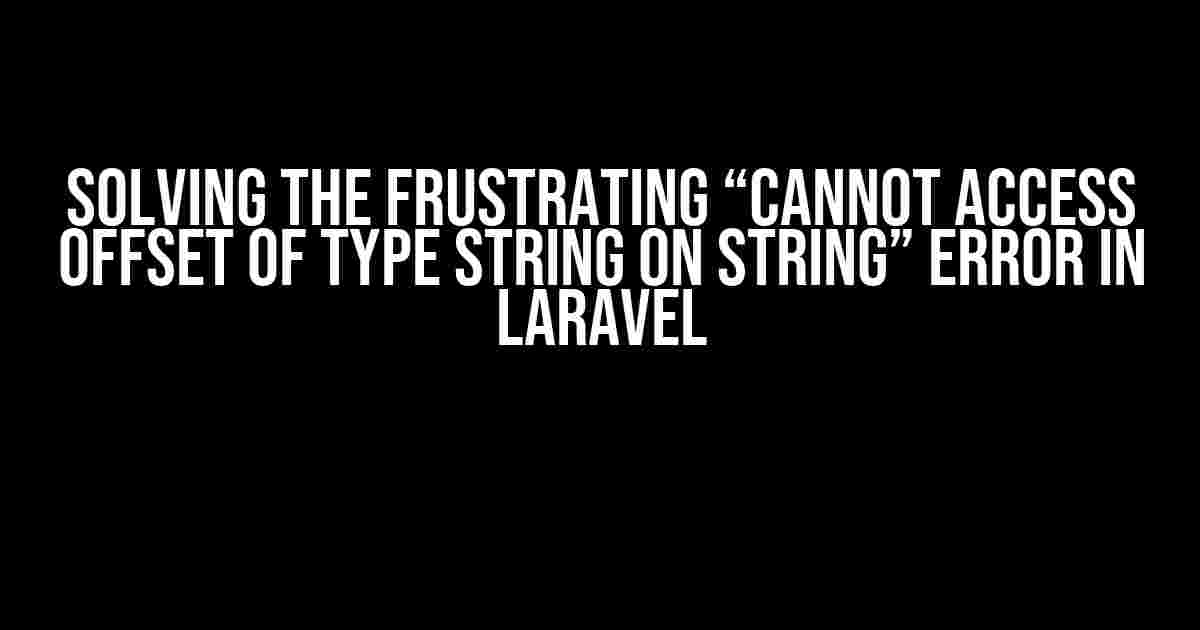Are you tired of seeing the annoying “Cannot access offset of type string on string” error whenever you try to serve dummy data to your Laravel application? You’re not alone! This error can be frustrating, especially when you’re trying to get your development environment up and running. But fear not, dear developer, because today we’re going to tackle this issue head-on and provide you with a comprehensive guide to overcome this obstacle.
What is Causing this Error?
For example, let’s say you have a controller method that’s trying to serve dummy data to your view:
public function index()
{
$data = 'Hello World';
return view('index', ['data' => $data]);
}
In this scenario, if you try to access `$data` as an array in your view, such as `{{ $data[0] }}`, you’ll get the dreaded error.
Fixing the Error: Understanding Array vs. String
The first step in fixing the error is to understand the difference between an array and a string. In PHP, an array is a compound data type that stores multiple values. You can think of it as a collection of key-value pairs.
| Array Example | String Example |
|---|---|
$data = ['foo' => 'bar', 'baz' => 'qux']; |
$data = 'Hello World'; |
| This is an array with two key-value pairs. | This is a string. |
Now that we’ve covered the basics, let’s move on to fixing the error.
Method 1: Verify Your Data Type
The most straightforward way to fix the error is to verify the data type of the variable before trying to access it as an array. You can use the `gettype()` function to check if the variable is an array or a string.
public function index()
{
$data = 'Hello World';
if (is_array($data)) {
// $data is an array, proceed with caution
} else {
// $data is a string, handle accordingly
}
return view('index', ['data' => $data]);
}
In this example, we’re using the `is_array()` function to check if `$data` is an array. If it’s not an array, we can handle it as a string.
Method 2: Cast Your Variable to an Array
Sometimes, you might need to force a string into an array. You can use the `(array)` cast to achieve this.
public function index()
{
$data = 'Hello World';
$dataArray = (array) $data;
return view('index', ['data' => $dataArray]);
}
By casting `$data` to an array, we’re essentially converting the string into a single-element array.
Method 3: Use the `collect()` Helper
Laravel provides a convenient `collect()` helper that can convert a string into a collection (which is essentially an array).
public function index()
{
$data = 'Hello World';
$dataCollection = collect([$data]);
return view('index', ['data' => $dataCollection]);
}
The `collect()` helper is a nice way to ensure that your data is always an array, even if it’s originally a string.
Best Practices to Avoid the Error
To avoid the “Cannot access offset of type string on string” error altogether, follow these best practices:
- Validate your data: Always validate your data to ensure it’s in the expected format. Use tools like Laravel’s built-in validation features or third-party libraries to validate your data.
- Use type hinting: Use type hinting in your code to specify the expected data type. For example, `public function index(array $data) {}`.
- Be mindful of PHP’s loose typing: PHP is a dynamically-typed language, which means it can be easy to accidentally assign the wrong data type to a variable. Be mindful of this and use strict typing whenever possible.
Conclusion
The “Cannot access offset of type string on string” error can be frustrating, but with these methods and best practices, you’ll be well-equipped to handle it. Remember to always verify your data type, cast your variable to an array if necessary, and use the `collect()` helper when needed. By following these tips, you’ll be serving dummy data to your Laravel application in no time!
Happy coding!
Frequently Asked Question
Stuck with the “Cannot access offset of type string on string” error in Laravel? Don’t worry, we’ve got you covered!
What is the “Cannot access offset of type string on string” error in Laravel?
This error occurs when you’re trying to access an array offset on a string variable. In other words, you’re treating a string as an array, which is not allowed in PHP.
How do I identify the source of the error in my Laravel application?
To identify the source of the error, check your Larael log files ( usually located in storage/logs ) and look for the error message. The log file will give you the exact file and line number where the error is occurring. You can also use Laravel’s built-in debugging tools, such as the dd() function, to debug your code and find the issue.
What are some common causes of the “Cannot access offset of type string on string” error in Laravel?
Some common causes of this error include: attempting to access an array key on a string variable, using a string as an array in a blade template, or passing a string to a function that expects an array as an argument.
How can I fix the “Cannot access offset of type string on string” error in my Laravel application?
To fix the error, you need to identify the variable that is causing the issue and make sure it’s an array. You can use the is_array() function to check if a variable is an array. If it’s not an array, you need to convert it to an array or access it correctly as a string.
What are some best practices to avoid the “Cannot access offset of type string on string” error in Laravel?
Some best practices to avoid this error include: always checking the type of a variable before using it, using Laravel’s built-in validation and type checking features, and testing your code thoroughly to catch any errors before they become a problem.

